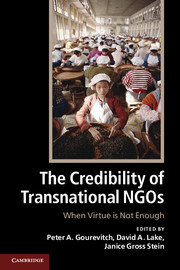1 - Beyond virtue
evaluating and enhancing the credibility of non-governmental organizations
from Introduction
Published online by Cambridge University Press: 05 June 2012
Summary
Does being virtuous guarantee credibility for transnational non- governmental organizations (NGOs)? NGOs are increasingly important in monitoring the ethical behavior of others – certifying that products are made according to socially responsible standards or that elections are free and fair. Likewise, NGOs now deliver greater humanitarian aid around the world than ever before. In both the monitoring and humanitarian activities of NGOs, we rely largely on their own reports to verify performance. Do the products actually meet the desired standards? Does the aid help relieve human suffering? Usually, we are far away from the scene of production or assistance and cannot observe directly what NGOs are doing. Generally, we assume that they have carried out the responsibilities that we, as a society, entrust to them. Yet, sometimes we have reason to wonder about the virtue of NGOs, and we seek reassurances. This book is about that doubt and how it is managed and, possibly, manipulated. When are statements by NGOs credible and believable, when are they not?
Most NGOs are, indeed, virtuous. They pursue laudable goals, attract dedicated individuals who labor hard for little remuneration, and – in general – do good work. We find them credible, in turn, precisely because of their virtue. Recent surveys show that NGOs are trusted to address pressing social problems more than governments or businesses. But is virtue sufficient? Whereas transnational NGOs were once mostly small groups of committed activists, many now are major organizations, and as such are subject to all the pathologies common to large bureaucracies. Reports of malfeasance by nonprofit corporations, increasing in the United States at least, threaten to undermine confidence in the virtue of the entire NGO community (Gibelman and Gelman 2004). Even in the absence of explicit wrongdoing, however, NGOs can be threatened with a loss of credibility. Kiva, the leading peer-to-peer (P2P) microfinance NGO, for instance, was heavily criticized for oversimplifying its lending procedures on its website by friendly critics who feared that its misrepresentations might undermine support for microfinance institutions as a group. Kiva was forced to respond to preserve its credibility (see Chapter 7). Similarly, Islamic Relief was challenged after September 2001 on its charitable work in Islamic countries, especially by Western governments worried that it was channeling funds to possible terrorists. It undertook a series of institutional reforms to show a now more skeptical audience that it was, in fact, acting in accordance with the practices of other similar NGOs (Chapter 6). When virtue is not sufficient, NGOs turn to other mechanisms to enhance their credibility. They are not passive actors who take their virtue for granted, but are active shapers of how they are perceived by others. Our central question, then, is when, why, how, and to whom do NGOs make themselves credible when virtue alone is not enough?
- Type
- Chapter
- Information
- The Credibility of Transnational NGOsWhen Virtue is Not Enough, pp. 3 - 34Publisher: Cambridge University PressPrint publication year: 2012
- 6
- Cited by



